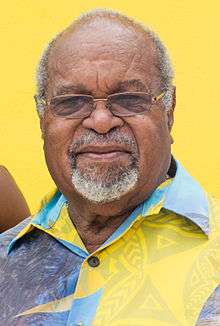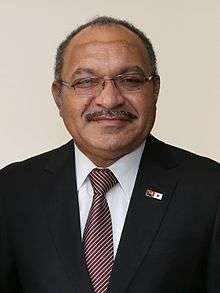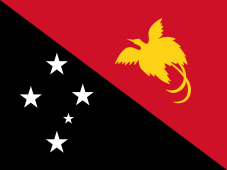Prime Minister of Papua New Guinea
The prime minister of Papua New Guinea is Papua New Guinea's head of government, consequent on being the leader of the party or coalition with majority support in the National Parliament. The Prime Minister serves as the head of his party the coalition government and the chairman of the National Executive Council. The PM's Office Was Preceded by the Chief Ministry.
| Prime Minister of Papua New Guinea | |
|---|---|
 | |
| Appointer | Bob Dadae Governor-General of Papua New Guinea |
| Term length | At the Governor-General's pleasure |
| Inaugural holder | Michael Somare |
| Formation | 16 September 1975 |
| Salary | $263,827 USD annually[1] |
 |
|---|
| This article is part of a series on the politics and government of Papua New Guinea |
|
Executive |
|
Legislature
|
|
Judiciary
|
|
Administrative divisions |
|
|
|
Related topics
|
2011–12 constitutional crisis
From December 2011, the office was disputed between Peter O'Neill of the People's National Congress Party and Sir Michael Somare of the National Alliance Party; the latter eventually supported O'Neill as Prime Minister on 3 August 2012, thus ending the constitutional crisis.
List of prime ministers of Papua New Guinea (1975–present)
| No. | Name (Birth–Death) |
Tenure | Political Affiliation | Image | ||
|---|---|---|---|---|---|---|
| Took Office | Left Office | |||||
| 1 | Michael Somare (1936–) |
16 September 1975 | 11 March 1980 | Pangu Party[2][3][4] |  | |
| 2 | Sir Julius Chan (1939–) |
11 March 1980 | 2 August 1982 | People's Progress Party[2][3] | ||
| (1) | Michael Somare (1936–) |
2 August 1982 | 21 November 1985 | Pangu Party[2][3][4] |  | |
| 3 | Paias Wingti (1951–) |
21 November 1985 | 4 July 1988 | People's Democratic Movement[2][3] | ||
| 4 | Sir Rabbie Namaliu (1947–) |
4 July 1988 | 17 July 1992 | Pangu Party[2][3] | ||
| (3) | Paias Wingti (1951–) |
17 July 1992 | 30 August 1994 | People's Democratic Movement[3] | ||
| (2) | Sir Julius Chan (1939–) |
30 August 1994 | 27 March 1997 | People's Progress Party[3][4] | ||
| 5 | John Giheno (1949–2017) |
27 March 1997 | 2 June 1997 | People's Progress Party | ||
| (2) | Sir Julius Chan (1939–) |
2 June 1997 | 22 July 1997 | People's Progress Party[3][4] | ||
| 6 | Bill Skate (1953–2006) |
22 July 1997 | 14 July 1999 | People's National Congress Party[3][4] |  | |
| 7 | Sir Mekere Morauta (1946–) |
14 July 1999 | 5 August 2002 | People's Democratic Movement[4] | ||
| (1) | Sir Michael Somare (1936–) |
5 August 2002 | 2 August 2011 Disputed from 14 December 2011 to 3 August 2012 |
National Alliance Party[2] |  | |
| – | Sam Abal (1958–) |
13 December 2010 | 17 January 2011 | National Alliance Party[2] | ||
| 4 April 2011 | 2 August 2011 | |||||
| 8 | Peter O'Neill (1965–) |
2 August 2011 Disputed to 3 August 2012 |
29 May 2019 | People's National Congress Party |  | |
| 9 | James Marape (1971–) |
30 May 2019 | Incumbent | Pangu Party | _(cropped).jpg) | |
gollark: https://vignette.wikia.nocookie.net/dragcave/images/7/7f/Garland_mature_hatchi.png/revision/latest?cb=20171225233339Look at the garland hatchlings. So circular.
gollark: Much timefulness.
gollark: I was complaining about too few offers on my cheese and ice. Now I have too many.
gollark: The trick is to never pay attention to what you're breeding together.
gollark: 2 groups!
See also
References
- "SALARIES AND REMUNERATION COMMISSION - DETERMINATIONS" (PDF). www.parliament.gov.pg.
- "Background Note: Papua New Guinea". US State Department. April 2007. Retrieved 2007-08-14.
- Dorney, Sean (2001). Papua New Guinea: people, politics and history since 1975. ABC Books. ISBN 0-7333-0945-3.
- May, R.J. (2001). State and society in Papua New Guinea: the first twenty five years. Crawford House Publishing. ISBN 1-86333-204-9.
This article is issued from Wikipedia. The text is licensed under Creative Commons - Attribution - Sharealike. Additional terms may apply for the media files.
